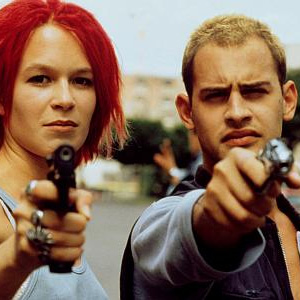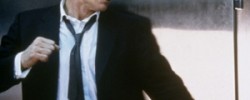Review: Run Lola Run (1998)
Cast: Franka Potente, Moritz Bleibtreu, Armin Rohde
Director: Tom Tykwer
Country: UK | Germany
Genre: Crime | Thriller
Official Trailer: Here
Chief among that sadly rare breed of foreign film which manages to partially transcend the stubborn subtitle aversion of mainstream audiences, Run Lola Run seems to have engrained itself in the very same pop culture it is so much a product of since its original 1998 release. The springboard from which the careers of writer/director Tom Tykwer and leads Franka Potente and Moritz Bliebtreu were launched, its frenzied kinetic storytelling and stylised approach to traditional narrative has established it as a lasting mainstay of “the best of world cinema” lists whose popularity seems set to carry on ad infinitum.
Perhaps the secret to Run Lola Run’s success can be sourced in its experimental approach to narration; a contemporary of the likes of Memento, Fight Club, Pulp Fiction, and The Usual Suspects, its focus on the subversion of narrative norms came at a time of immense popularity for irregular plot structures. It takes as its central conceit the titular character’s efforts to somehow replace the 100,000 Marks her boyfriend owes to a powerful gangster. As basic a story as they come, Run Lola Run’s complication comes in its twice restarting the entire narrative from the beginning, resetting the world of the film and undoing the failures of its characters.
As basic a story as they come, Run Lola Run’s complication comes in its twice restarting the entire narrative from the beginning, resetting the world of the film and undoing the failures of its characters.
 The bare story of Tykwer’s script is rooted in conventional storytelling and uses this primarily simplistic setup as a base from which to begin a discourse on the very nature of narrative itself. As the name suggests, this is a fast film, rarely breaking for breath and constantly accelerating forward to its ever shifting conclusion. A pounding score and rapid-pace editing give the film a constant feel of immediacy, and we the audience the same sensation of urgency which hangs over Lola. Yet, when complications arrive and her efforts fail, she is in essence born anew and free to start over. The film plays out like a video game—the added scenes of animation and an early montage constructed in the fashion of a character selection screen supplement this—with Lola as the player who seems to learn from her previous mistakes and subsequently avoid them the following time. She becomes, in some regard, self-aware as a character; her “memory” of parallel timelines that she cannot, in each new incarnation, have actually experienced allows her to escape the bounds of predetermined narrative course and select her own ending.
The bare story of Tykwer’s script is rooted in conventional storytelling and uses this primarily simplistic setup as a base from which to begin a discourse on the very nature of narrative itself. As the name suggests, this is a fast film, rarely breaking for breath and constantly accelerating forward to its ever shifting conclusion. A pounding score and rapid-pace editing give the film a constant feel of immediacy, and we the audience the same sensation of urgency which hangs over Lola. Yet, when complications arrive and her efforts fail, she is in essence born anew and free to start over. The film plays out like a video game—the added scenes of animation and an early montage constructed in the fashion of a character selection screen supplement this—with Lola as the player who seems to learn from her previous mistakes and subsequently avoid them the following time. She becomes, in some regard, self-aware as a character; her “memory” of parallel timelines that she cannot, in each new incarnation, have actually experienced allows her to escape the bounds of predetermined narrative course and select her own ending.
The concept of narrative predetermination leads us to the binary opposition of fate and luck in life, a concept with which Run Lola Run is fascinated. Lola’s timing is crucial in each of her three narratives; the little differences in her actions and the point at which she performs them radically alters the lives of each person whom she encounters. An image of dominoes at one point of the film invokes the idea of direct cause and effect, an aspect of narration the film examines with these tangential glimpses into tertiary characters’ futures. The idea that the tiniest of differences in these lives’ crossovers with Lola might be the definitive factor in a wildly different course of existence is knowingly something of a facetious one, but the likelihood toward which the film attaches itself.
Whatever the meandering, traditional narrative-defying effect of Run Lola Run’s tri-part structure, its central relationship acts as the binding agent that keeps the entire film together, even though these characters share very little time onscreen. The three segments are segregated by intimate scenes of the couple in bed discussing their relationship, firstly with Lola as the inquisitor and later with Manni. Tykwer basks their naked bodies in a passionate red embrace; the scenes strip the flashiness of the rest of the film and leave us with a bare aesthetic, and the real truth of these people. “What if you never met me?” asks Lola, wondering if she is not Manni’s soulmate, just the closest he has come to finding her thus far. Potente and Bliebtreu work together seamlessly, the legitimacy of their pairing rendering the film less a stylistic and formic exercise than a study of real characters and their finding each other in a world of wild chance.
Tykwer basks their naked bodies in a passionate red embrace; the scenes strip the flashiness of the rest of the film and leave us with a bare aesthetic, and the real truth of these people.
 A pulchritudinous pulsation of pop culture influence, Run Lola Run is a fast-paced tour through a postmodernist world of intersecting alternate realities, showcasing the widely divergent courses our lives may take and the importance of even the most infinitesimal of choices. Few films have so much raw energy on display, and fewer still manage to marry it with the dramatic weight of realised characterisation. For all its toying with the perceptions of narrative and its clever investigation of the ideas of predestination and self-determination, at its core Tykwer’s film is a simple love story, honing in on the desperate efforts this couple makes to get through life together. It challenges the mind, but its real talent is in broadening the mouth and getting the heart pumping.
A pulchritudinous pulsation of pop culture influence, Run Lola Run is a fast-paced tour through a postmodernist world of intersecting alternate realities, showcasing the widely divergent courses our lives may take and the importance of even the most infinitesimal of choices. Few films have so much raw energy on display, and fewer still manage to marry it with the dramatic weight of realised characterisation. For all its toying with the perceptions of narrative and its clever investigation of the ideas of predestination and self-determination, at its core Tykwer’s film is a simple love story, honing in on the desperate efforts this couple makes to get through life together. It challenges the mind, but its real talent is in broadening the mouth and getting the heart pumping.
Related Posts
Ronan Doyle
Latest posts by Ronan Doyle (see all)
- This Week on Demand: 14/07/2013 - July 15, 2013
- Review: The Hunt (2012) - July 12, 2013
- This Week on Demand: 07/07/2013 - July 9, 2013






























